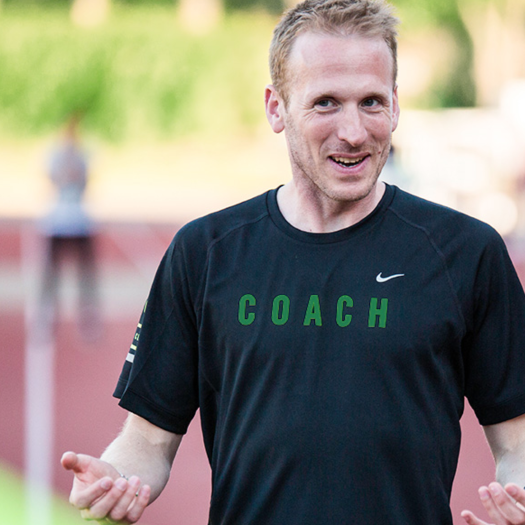- You can do more than you think!
- Breathe deeply and take off
- Achieve big goals
- Work goal-oriented
- Be flexible
- When the going gets tough, you've already done the worst
- Talking it up
Running is good for you and your health. Because it's been no secret for a long time that running is not a good thing for your fitness, but also for your mental health. If you take something with you for everyday life, you can only benefit from it!
Especially newcomers to running have little confidence in themselves. Running? Phew, that's exhausting. But often it's just a question of pace. Someone who starts running and forces himself to start extremely slowly will celebrate himself after the first workout because he/she has come much further than expected.
And even for advanced racers, it shows time and again that with a plan, patience and the right race, much more can be achieved than expected. This is how even late starters achieve unexpected success.
The mix brings success! Much faster and more clearly than at work or in everyday life, you realize how important breaks are when you run. If you always go full throttle, you will be tired, exhausted and injured or catch a cold.
Then there's no chance of reaching the next goal. That's why it's important to allow yourself breaks and to plan them actively. Periodization is the order of the day, i.e. the conscious planning of workload and unload.
This is true in both elite and recreational sports, and of course in all other areas of life as well. An example of someone running 3 times a week would be something like: Doing a casual endurance run, a long endurance run, and a strenuous tempo run. Each with 1-2 days of rest or other sport in between. This way you have recovery periods and time for adaptation.
Endurance sports are always a matter of the head. When you start your training and set your sights on something new or even run a race, you never know what's going to happen. Only that it will probably be hard.
I always felt the same way: standing at the starting line and running 42 km at almost 20 km/h through Berlin?! What? Never! And yet it works, if you don't think about the entire route, but work your way forward with the salami tactic.
Piece by piece, kilometer by kilometer, slice by slice. If you feel bad, just remember that you can definitely make it to the next house corner. And then to the place where your friends are cheering you on. And then to the next intermediate marker.
That's how you keep moving forward and suddenly realize that you've overcome your interim low and things are rolling again. By the way, I used the same tactics to get through my physics studies. There were also a few intermediate lows. So this strategy doesn't just help with running.
If you really want to succeed in reaching your goals, no matter where, you need a plan. You need to figure out what load you want to put on yourself and when, and when the breaks are scheduled. We have already seen that in point 2.
However, general planning is also important. When do I have to achieve which goal? What do I have to train for it and when? How much time do I have, what can I invest, what do I want to invest?
If I want to run a half marathon, for example, I first have to ask myself what my current training status is. Can I already handle 10 km at a stretch or not? If so, how fast? Then I plan backwards from the time of the desired half marathon: brave a week before, so only little training.
Then a test race 10 days to 2 weeks before the big race. Preferably a 10er. Also for this one I should already be a bit recovered, so not too much balling just before. And so I should make a rough timetable until my today.
Vacations and special professional or family challenges are also to be integrated into this and then we move on to point 5...
A plan is good, a plan is important. Nevertheless, things rarely go as planned. Neither in the job, nor in sports.
Maybe it's even worse in sports, because with a small cold you can usually still perform at your best at work, but you can't reach your full athletic potential. I once tried.
Doing a cross run with a mini cold. Not a good idea ... and especially because running often takes place outside and no one runs as fast in wind and rain as they do when it's 12 degrees and sunny, we always need a Plan B. (and C and D and ...)
I then recommend the following view of things: If you can't get angry when something doesn't work out, then you don't have enough ambition for big goals and if something doesn't go wrong more often, then you can't be so extremely happy when it finally does.
Why the hell else would anyone run marathons at all? There are truly easier things in life.
It doesn't matter whether it's before an important test or before a race: What came before took much longer and was much harder than what is yet to come.
Memorizing exam material over and over again, or eating up miles over and over again and in all weathers. Phew, that can be a pain.
Compared to that, what's to come is comparatively harmless. Of course it's going to be hard, of course you don't know what's coming.
But then you apply point 3 and get through it. And hey: always remember that you have already successfully mastered very similar situations.
You wouldn't be allowed to take this test if you hadn't already passed 10 others, and you couldn't run this marathon if you hadn't successfully completed the running entry and later your first half marathon. So you can do it!
Maybe you've already caught me. Maybe you've already noticed that my tactic is often to talk myself out of difficult things.
Runners are always masters of cultivated self-deception. Is it raining? Cool, finally be a kid again and jump through the puddles. It gets dark early? Great, finally I can try out my new headlamp. I got lost? Great! Bonus kilometers done again. I bet you can think of a few more in this series.
Running is just a blast. Why? Everyone has their own answer to that. In any case, there's a lot we learn from and while running, even if it's just to turn off our heads every now and then and think about nothing at all. Because that also works great when you're comfortably jogging through the countryside.
- ISPO awards
- Mountain sports
- Bike
- Design
- Retail
- Fitness
- Health
- ISPO Job Market
- ISPO Munich
- ISPO Shanghai
- Running
- Brands
- Sustainability
- Olympia
- OutDoor
- Promotion
- Sports Business
- ISPO Textrends
- Triathlon
- Water sports
- Winter sports
- eSports
- SportsTech
- OutDoor by ISPO
- Heroes
- Transformation
- Sport Fashion
- Urban Culture
- Challenges of a CEO
- Trade fairs
- Sports
- Find the Balance
- Product reviews
- Newsletter Exclusive Area
- Magazine




